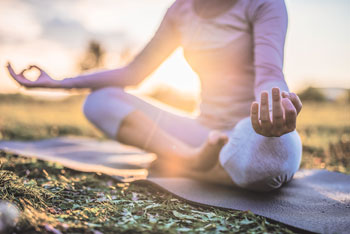 The COVID-19 pandemic has ushered in uncertainty, leaving many of us feeling confused, frustrated and fearful. Daily we face threats to our physical safety and financial security. An accumulation of these macro-level stressors makes it more difficult for us to handle the mundane, daily stresses of living. Our traditional methods of coping are challenged and we are forced to reimagine a new “normal.”
The COVID-19 pandemic has ushered in uncertainty, leaving many of us feeling confused, frustrated and fearful. Daily we face threats to our physical safety and financial security. An accumulation of these macro-level stressors makes it more difficult for us to handle the mundane, daily stresses of living. Our traditional methods of coping are challenged and we are forced to reimagine a new “normal.”
During times of crisis, it is more important than ever to practice self-care. Self-care is a popular term that brings to mind visions of bubble baths, expensive shopping sprees and decadent foods. The ugly truth is that self-care is often not glamorous. It is a daily practice of building healthy habits for a strong body and mind. Said another way, self-care is deliberately taking care of your well-being through restorative activities.
About seven months ago, I would have defined self-care as simply making sure to eat and sleep. At the time, I was working as a clinical assistant professor and staff psychologist at a top 10 university. I started every day darting out the door with no breakfast in my belly and haphazardly putting makeup on while I drove to work. I went to work and had few breaks and finished my day only to crash on the couch to watch Netflix and scroll social media. I was in complete denial about what I needed to do to take care of myself. Ultimately, I burned out, and I quit my job. I decided to pursue my passions of entrepreneurship and family by moving closer to home (Fayetteville) to start my private therapy practice. As a licensed psychologist, a large part of my job is to support people who are suffering from stress and mental health-related concerns. I learned quickly that to serve my clients successfully in a sustainable way, I needed to be a relaxing presence, which meant I had to take care of myself. That’s when I discovered how to practice self-care. My foundation began with a healthy diet, proper hydration, physical activity and adequate rest. I added three other restorative activities to this foundation, which were: moments of stillness in silence, practicing spirituality and belonging to a community.
Self-care involves attention and intention. Moments of stillness in silence can draw our attention from external noise to our inner voice. When we meditate, it brings awareness to that internal voice. When we have awareness, that’s when we can choose thoughts and feelings we’re holding onto and those we want to let go. The intention is to observe compassionately and nonjudgmentally those places inside yourself that need care.
In conclusion, I have one recommendation for you. I encourage you to try waking up one hour earlier in the morning to carve out some self-care time. My self-care daily ritual consists of: 10 minutes of meditation, 10 minutes of journaling, 10 minutes of affirmations, 10 minutes of visualization, 10 minutes of gratitude and 10 minutes of physical activity. You are so worth it. Start small, and remember, this is a practice and is not something you have to get perfect.
 The COVID-19 pandemic has ushered in uncertainty, leaving many of us feeling confused, frustrated and fearful. Daily we face threats to our physical safety and financial security. An accumulation of these macro-level stressors makes it more difficult for us to handle the mundane, daily stresses of living. Our traditional methods of coping are challenged and we are forced to reimagine a new “normal.”
The COVID-19 pandemic has ushered in uncertainty, leaving many of us feeling confused, frustrated and fearful. Daily we face threats to our physical safety and financial security. An accumulation of these macro-level stressors makes it more difficult for us to handle the mundane, daily stresses of living. Our traditional methods of coping are challenged and we are forced to reimagine a new “normal.” 
 How to resolve AdBlock issue?
How to resolve AdBlock issue? 








